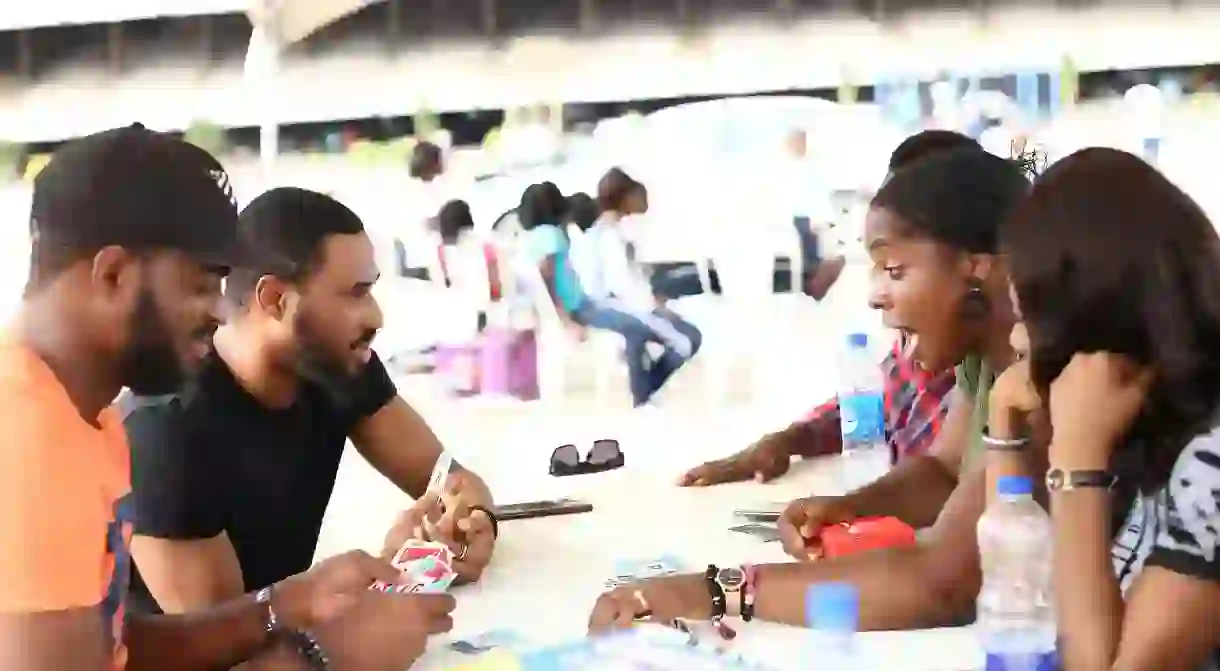Essential Pidgin Phrases You’ll Need in Nigeria

Language barriers are a regular problem for tourists heading abroad, but learning just a few words and phrases can really help out.
Pidgin is an English-based creole language and Nigeria’s real lingua franca. English might be the official language, but in a country with well over 250 other local languages, Pidgin was developed to aid communication among people from different parts of the country, as well as between locals and Europeans.
Here are just a few useful phrases that will make your visit to Nigeria much simpler.
Greetings

This common greeting means ‘How is everything?’. A marker of camaraderie between Nigerians, it is a simple, informal greeting that’s best used with people you know well, or in casual settings. The verb at the end is often dropped, so beware: if someone asks you How far?, they aren’t referring to your journey to meet them.
This is another highly informal greeting – one to try out with a taxi driver or market seller, for instance. If anything, this one is even more informal than how far. It can also be used aggressively in the sense of ‘what’s your problem?’. Dropping the dey and asking someone wétin only is a good way of telling them to back off. Back it up with your best scowl.
The good thing about pidgin is that it most of it is easy to get your head around. ”You do well” simply means “Thank you”. For example, in an informal setting with a friend, you can say ”My friend you do well”.
”No wahala” is the pidgin expression used for confirmation or approval. When someone says “No wahala”, it could mean “Yes” or “No problem”. When you want to say “No” then this word alone will do. “Wahala” on its own means ‘”trouble”, similar to the way the word bacchanal is used in the Caribbean. It can also refer to stress.
Try out your language skills on these tours around Nigeria.
Directions

Knowing how to ask where the bathroom is in pidgin is an obvious essential.
This is pretty easy, as it is all English — it’s just the manner in which it is spoken. Giving a Taxi directions in pidgin is always helpful – as long as you know where you’re going, of course.
”E don do” or “Stop” as a sign or an instruction is a word you cannot go without while travelling through Nigeria’s big cities.
See some of the best wildlife in Nigeria with these amazing safari trips.
At the restaurant / bar

Perhaps you just had one of Nigeria’s tasty traditional dishes and you want to express your pleasure and congratulate the chef. ”This food sweet well well” is the best way to give thanks and impress your hosts.
A definite must-use phrase in a country renowned for its amazing food, ”I wan chop” means you’re hungry and want to eat.
Not to worry, if you’re dying of thirst anyone around you will know what you mean when you ask for water as it’s the same in pidgin English.
Learn about the customs and traditions of Nigeria with these fascinating cultural tours.
At the market

Knowing an essential phrase like this one will definitely help you strike a better bargain in Nigerian markets which can get a bit tricky for foreigners.
The prices of some things could be more expensive than you anticipated. A good bargain could come in handy here – ”E too cost abeg” is the pidgin language equivalent to expressing displeasure at the price of something.
The good news is that all numbers stay the same as in English.
Making friends

”Shayo” can refer to beer, red wine, vodka or whatever else you might fancy on a night out in one Nigeria’s bars. “Make we go shayo” is definitely a great way to make new acquaintances and lasting friendships.
Paying compliments is one of the easiest ways to make friends. ”Bobo you too fine” means that a man is handsome, while ”Babe you too fine” would be used to compliment a woman.
For everything else

Most often used as part of a request like “please could you let me pass”. Abeg, can also be used to express incredulity. For instance if you were engaged in a good old haggling session and the trader gives you a ridiculous price, you can let them know how ridiculous you find the price by exclaiming, “ah beg o!” or “Abeg! No waste my time!”
This is a common phrase you’ll often here used by Nigerians in reference to the city’s gridlock. it’s a phrase worth knowing for when you’re running late for a meeting, ”Go slow” means “Traffic jam”.
If you need to pass across some very important information, ”Listen well well” should get someone’s attention.
Perhaps you’re inviting someone to a big event and you need to forewarn them about the dress code, ”Baff up” means “Dress nicely”.
There isn’t a direct translation to English. It functions as a call to action and depending on context, can mean ‘come on’ or ‘hurry up’, similar to “vamos“ in Spanish or “schnell” in German. It can also be used to cajole; “oya na” can mean something along the lines of “please reconsider”.
This is an expression of surprise. The ‘oh’ at the end is usually added to a lot of words and phrases, a kind of conversational tick to add emphasis.
This article was originally written by a Hub Writer Fareeda Abdulkareem.













